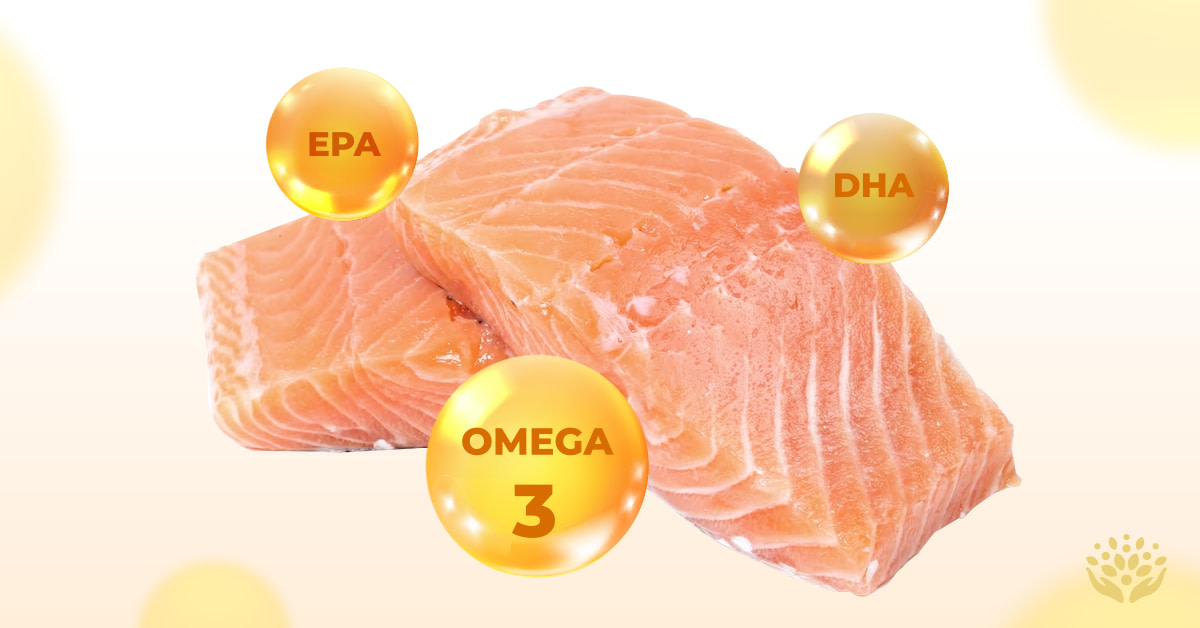
When was the last time you scarfed down a (BPA-free) can of (wild-caught) sardines for breakfast?
If it was any time in the last decade, then you can probably skip this blog. Chances are, you’re already getting your recommended intake of the fishy, fatty acid known as omega-3.

But if you’re like us and can’t quite stomach scaly squiggles in the morning, or even if you just struggle to eat two hearty servings of fish per week, the supplement sirens might be calling your name.
Omega-3 supplements have been gaining traction in the wellness world, reaching near-viral status as more and more influencers catch wind of its many, many health benefits. But is it worth the hype, or is it a red herring?
Scroll on to find out, fellow skippers! We asked the big fish, Dr. Neal — Woodstock Vitamins founder and notorious boat-rocker — to share the inside scoop on omega-3 supplements: why they’re getting popular, if they’re worth the price tag, and so on.
No, “Omega-3 Supplements and the Vital5” isn’t our new band name, but it does give you a glimpse at the direction we’re headed in.
Not that you needed it — if you’ve been swimming around this side of the internet for a while, you already know how we feel about omega-3 fatty acids.

Omega-3s make up 1/5th of the Vital5 for a few key reasons:
All that should be reason enough to hightail it over to your go-to, high-quality supplement manufacturer, but actually, that’s just the hook.
Learn More: 5 Crucial Nutrients (Almost) All of Us Are Lacking
Here’s the line and sinker: Omega-3s play a critical role in your body’s inflammatory response.
So, if you’re not hitting the recommended intake of omega-3s, your body is going to struggle with regulating inflammation. But inflammation isn’t the Big Bad Wolf it’s made out to be (more on that below).
It’s chronic inflammation that we have to look out for, as recent research has linked it to a whole host of unpleasant things, ranging from uncomfortable symptoms to serious health issues:
But the good news is, as we continue to learn more about how chronic inflammation can wear down the body, we’re also learning how regulating inflammation can improve bodily functions.
Omega-3, the anti-inflammatory powerhouse has been shown to have positive effects on a range of symptoms and body systems:
Despite their gleaming reputation, omega-3s aren’t the only oily fish in the sea, though.

Omega-3s work in tandem with their pro-inflammatory counterpart, omega-6s. The latter, omega-6, is responsible for creating and maintaining inflammation in the body, but before you start quivering in your hip waders, let’s reframe our understanding of inflammation.
Inflammation is an intelligent, purposeful defense mechanism of the body that helps us fight off infections and defend against harmful stimuli.
Omega-6 turns up the heat when a toxin sneaks into our bodies, and omega-3 calms the body to avoid chronic, low-level inflammation.
So, in the inflammatory response process, omega-3 and omega-6 work together in a yin and yang dance, with both nutrients playing pivotal roles.
Learn More: 5 Myths About Omega-3 Supplements
Typically we want to see a 4:1 ratio of omega-6 to omega-3, but unfortunately, most Americans are getting closer to 20:1.
Sound fishy? Well, we can point fingers at the average Western diet of highly processed and nutritionally bankrupt food, which includes a whole lot of omega-6s and not a whole lot of omega-3s.
These fatty acids are processed by the same enzyme system, so both the omega-3s and omega-6s we ingest will be standing in line at the same gate in the body. Following this metaphor, if you have a swarm of 50 Omega-6s crowding the line, the poor little Omega-3s will be twiddling their anti-inflammatory thumbs for ages.
Ideally, we want the Omega-3 and Omega-6 to enter our bodies like a well-oiled zipper. It should be a more synchronized dance of:
Omega-3 | Omega-6 | Omega-3 | Omega-6…and so on.
This balanced influx ensures that both nutrients have a fair shot at doing their jobs effectively.
Maintaining this optimal level of balance between omega-3s and omega-6s through diet alone isn’t an easy feat for most of us modern folks. We’ve got bigger fish to fry — bills to pay, meetings to slouch in, appointments to run to, kids to pick up, etc.
Omega-3 supplements, then, can fill in these nutritional gaps and keep us from developing diseases of deficiencies, when done right.
And doing omega-3 supplementation right means:
The American Heart Association recommends at least two servings of fatty fish (or the supplement equivalent) per week. That amounts to about 500 milligrams (mg) to 1,000 mg of DHA and EPA per serving, so you’re looking at a recommendation of 1,000 to 2,000 mg per week.
But that’s just the minimum dose needed to see minimum results. You’ll likely want to be hitting the highly studied doses — which are closer to 1,000 to 3,000+ mg per day.
It’s not just the omega-3s in omega-3 supplements that are helping your heart, skin, tummy, and brain, though. The phrase omega-3 is actually a bit of an umbrella term, encapsulating the two other omega fatty acids that play a critical role in driving down inflammation: EPA and DHA.

Higher doses of EPA and DHA will provide you with better results than supplements that have minimal doses. Point blank.
So, look for omega-3 supplements that provide clear information about the serving size of EPA and DHA per pill. That way, you know exactly how much of these powerhouses you’re getting.
We’re aiming for a dose of 3,000mg of EPA and DHA in a day, but don’t forget to factor in the omega-3 content from your diet as well.
Learn More: Debunking 5 MORE Omega-3 Supplement Myths
Besides the omega-3, EPA, and DHA dose factor, there’s one other major component to choosing the right supplement: the gross factor.
(Dose and gross — pretty easy to remember, right? Thanks for that, Dr. Neal.)
Omega-3 supplements are almost always made from fish oil and if you haven’t heard, fish live in the ocean. These humble aquatic creatures are swimming through plastic-infested waters, chowing down on garbage and toxins due to the continued pollution of our planet.
Ick.
The fish used to make your omega-3 supplement, then, can be loaded with heavy metals and microplastics, and the oil created can turn rancid at the drop of a hat.
Both elements can directly negate the benefits of omega-3s, and rancidity in particular flips the switch from anti-inflammatory to pro-inflammatory.
So: Finding an omega-3 supplement manufacturer with meticulously defined, rigorously upheld standards for quality control and proper storage is a make-or-break detail for successful supplementation.
Omega-3 supplements aren’t just a big fish in a small, wellness-related pond.
The data, cutting-edge research, and personal experiences of Dr. Neal‘s patients all point to its critical role in maintaining long-term health in the modern age. So don’t leave your heart, brain, gut, and skin health up to salmon else — take your supplementation strategy by the gills!
And if you need a captain to steer you in the right direction, you can chat with a supplement strategist for free with a Counterside Consult. (Fish puns not included.)

Shop the Vital 5
Peek behind the curtain of supplement industry misinformation and enjoy special promotions, podcast episodes, and our No-BS approach to holistic care, sent weekly.

We built the model for finding supplements that work for your wellness, your wallet, and the world. Learn More
Peek behind the curtain of supplement industry misinformation and enjoy special promotions, podcast episodes, and our No-BS approach to holistic care, sent weekly.

We built the model for finding supplements that work for your wellness, your wallet, and the world. Learn More
These statements have not been evaluated by the Food and Drug Administration. This product is not intended to diagnose, treat, cure or prevent any disease.
Use only as directed. Consult your healthcare provider before using supplements or providing supplements to children under the age of 18. The information provided hereinis intended for your general knowledge only and is not intended to be, nor is it, medical advice or a substitute for medical advice. If you have or suspect you have a specific medical condition or disease, please consult your healthcare provider.

By clicking “Accept”, you agree to the use of cookies on your device in accordance with our Privacy and Cookie policies